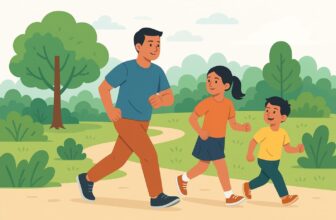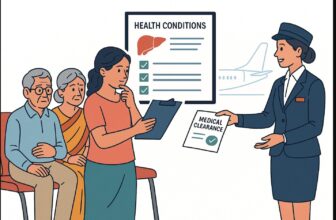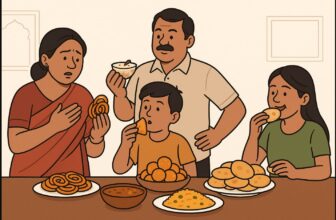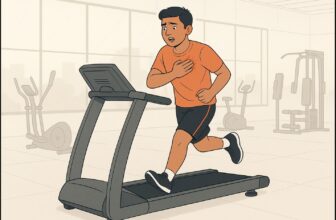Heart disease has quietly become India’s biggest health crisis. Every fourth death in the country is now due to cardiovascular issues, and many of these begin with undiagnosed heart blockages.
What’s more alarming is how often these early signs are ignored or mistaken for something minor, acidity, gas, tiredness, or even “just stress.” But small symptoms often come before serious problems. That’s why it’s critical to know the signs early, act early, and live longer.
What Is a Heart Blockage?
A heart blockage happens when the arteries that supply oxygen-rich blood to your heart muscles get narrowed or blocked due to cholesterol-based plaque. This reduces blood flow and oxygen, eventually leading to:
- Chest discomfort
- Angina (exertion-linked chest pain)
- Heart attack (complete artery blockage)
- Sudden cardiac arrest
Early warning signs are often subtle, but they’re not imaginary. Knowing what to look for can make the difference between life and irreversible damage.
Heart Disease Is No Longer Just an Old Age Problem
- Increasingly common in Indian men and women as young as 30
- Contributing factors: high-stress lifestyles, smoking, poor diets, diabetes, and lack of exercise
- Many Indians only discover a blockage after a first heart attack
12 Early Symptoms of Heart Blockage to Watch For
1. Chest Discomfort, Not Just Pain
You may feel pressure, tightness, or a “heaviness” in the chest, especially during activity or emotional stress. It might feel like gas, but if it doesn’t ease with rest or antacids, it could be a red flag.
Commonly mistaken as acidity in Indian households.
2. Shortness of Breath While Doing Simple Tasks
Can’t climb stairs like you used to? Out of breath after mild walking? It may not just be unfitness, heart blockages can limit oxygen supply and make your heart work harder.
3. Unusual Tiredness or Fatigue
Feeling drained despite 8 hours of sleep? Constant fatigue with no clear reason is often an early warning sign, especially in women.
Frequently ignored or blamed on low iron or thyroid.
4. Pain in Arm, Jaw, Neck, or Back
A heart problem doesn’t always show up in the chest. Pain may radiate to the left arm, jaw, upper back, or even shoulders. It may come and go or feel like a dull ache.
Seen especially in diabetics and women.
5. Sudden Cold Sweating
Cold, clammy sweat without any physical exertion could be a sign of your heart struggling. If it appears with other symptoms (like chest heaviness or dizziness), don’t wait.
6. Heart Skipping or Racing (Palpitations)
If your heartbeat feels irregular, fluttering, pounding, or unusually fast, even while resting, it may be your heart reacting to insufficient blood supply.
7. Dizziness or Lightheadedness
Feeling faint or like you might black out? Blockages can lower blood pressure and reduce blood flow to the brain, especially during activity.
8. Swollen Feet or Ankles
Fluid buildup from poor heart function can cause your feet or ankles to swell, especially by the end of the day.
This is more likely if you also have high BP or diabetes.
9. Feeling Nauseous or Losing Appetite
A blocked artery can trigger upper stomach discomfort, bloating, or a loss of appetite. Often brushed off as indigestion, but persistent symptoms, especially in older adults, need evaluation.
10. Trouble Sleeping Due to Breathlessness
Waking up gasping or needing to sleep with your head elevated? This may indicate fluid buildup in your lungs caused by heart dysfunction.
11. Dry Cough That Doesn’t Go Away
If you have a persistent dry or frothy cough, especially when lying down, it might be your heart, not your lungs, that’s causing it. Fluid backup into the lungs can trigger coughing.
12. Pain Between Shoulder Blades or Upper Back
Not all heart-related discomfort shows up in front. Some people feel a burning, squeezing, or dull pain in the upper back, often misattributed to posture or muscle strain.
What You Should Do If You Notice Heart Blockage Signs
Don’t Wait for All 12 Symptoms to Show Up
Even 1 or 2 recurring symptoms deserve attention. It’s better to investigate and find nothing than to miss a silent warning.
See a Doctor, Not Google
Get a basic heart evaluation with:
- ECG (electrocardiogram)
- 2D ECHO (ultrasound of the heart)
- TMT (treadmill test) if symptoms worsen with activity
- Blood tests: cholesterol, sugar, triglycerides
For higher risk individuals, doctors may recommend:
- CT Coronary Angiography
- Calcium scoring
- Stress ECHO
Know Your Numbers
If you have any of these:
- Diabetes
- Hypertension
- High cholesterol
- Obesity
- Family history of heart attacks
You should get screened even without symptoms.
Summary: Small Symptoms, Big Consequences
In India, heart attacks often strike without warning, or rather, without being recognized in time. We brush off early signs as gas, overwork, or age. But your body often gives subtle clues before something serious happens.
You don’t need to panic, but you do need to pay attention.
Because a 15-minute check-up today could give you 15 more years to enjoy with your family, your work, your life.





